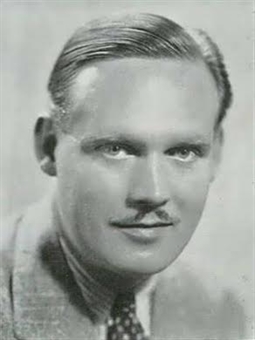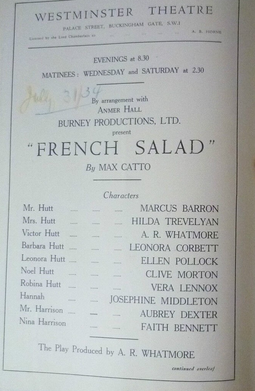
Cyril William North Raymond MBE was a British character actor. He maintained a stage and screen career from his teens until his retirement, caused by ill health, in the 1960s.
Harold Saxon-Snell (1889–1956) was a British stage and film actor. He appeared in twenty-three films during the silent and early sound eras. He is often credited as H. Saxon-Snell or Harold Snell. He and actress Kathleen Boutall married in 1922.
Melody of Death is a 1922 British silent crime film directed by Floyd Martin Thornton and starring Philip Anthony, Enid R. Reed and Dick Sutherd. It is an adaptation of the 1915 novel The Melody of Death by Edgar Wallace.

George and Margaret is a 1940 British comedy film directed by George King and starring Marie Lohr, Judy Kelly and Noel Howlett. It is based on the Gerald Savory's 1937 play of the same name by Gerald Savory, which had run for over three hundred performances in the West End. The film was made at Teddington Studios by the British subsidiary of Warner Brothers. The sets were designed by the art director Norman G. Arnold. Unlike a number of the company's films from the era, which are now considered lost, this still survives.
Cyril Percival (1889–1948) was a British film actor during the silent era.
The Old Man is a 1931 mystery play by the British writer Edgar Wallace. Its original production was staged at Wyndham's Theatre in London's West End for a ninety performance run. It is set entirely in the "Coat of Arms" tavern where a mysterious old man lurks in the background, reputedly an escapee from a lunatic asylum. The original cast included Alfred Drayton, Jack Melford, Harold Warrender and Finlay Currie.

Down Under Donovan is a 1918 crime novel by the British writer Edgar Wallace.
The Terror is a 1927 mystery thriller play by the British writer Edgar Wallace. It is based on Wallace's 1926 novel The Black Abbot.

The Melody of Death is a 1915 crime novel by the British writer Edgar Wallace. Believing that he is suffering from a fatal illness a newly-married man begins to commit a series of crimes to make sure his wife will be provided for after his death.
The Outsider is a play by the British writer Dorothy Brandon. It portrays the struggle of an unorthodox medical practitioner to gain acceptance by the medical establishment. It was subsequently revised to show the unconventional triumphing over the conventional, whereas the play had originally had the opposite ending.

The Man in Half Moon Street is a 1939 play by the British writer Barré Lyndon.

Our Betters is a comedy play by the British writer Somerset Maugham. Set in Mayfair and a country house in Suffolk, the plot revolves around the interaction between newly wealthy Americans and upper-class British society.

Paddy the Next Best Thing is a 1908 romantic comedy novel by the British writer Gertrude Page.

The Lisbon Story is a 1943 British musical composed by Harry Parr-Davies with a Book by Harold Purcell. It was produced by Edward Black. The plot is a wartime spy thriller set in Lisbon and Paris during the summer of 1942.

The Eleventh Commandment is a 1921 play by Brandon Fleming. It premiered at the Playhouse Theatre, Cardiff before transferring to the Royalty Theatre in London's West End where it ran for 32 performances between 16 January and 11 February 1922. The original West End cast included Henry Stoker, Edmund Breon, Dawson Millward and Viola Tree.

Castle in the Air is a comedy play by the British writer Alan Melville, which was originally performed in 1949.
The Happy Husband is a comedy play by the British-based Australian author Harrison Owen. It premiered at the Theatre Royal, Portsmouth before transferring to the Criterion Theatre in London's West End where it ran for 109 performances between 15 June and 17 September 1927. The London cast included Madge Titheradge, Stella Arbenina, A.E. Matthews, Charles Laughton, Lawrence Grossmith, David Hawthorne, Carl Harbord in his West End debut, Marda Vanne and Ann Trevor. It was produced by Basil Dean. It was staged at the Empire Theatre on Broadway the following year, running for 72 performances.
The Dippers is a comedy play by the British writer Ben Travers first performed in 1922 and based on his own 1920 novel of the same title. Featuring a musical score by Ivor Novello, it opened at the Royal Court Theatre in Liverpool before touring, and then transferring to the Criterion Theatre in London's West End where it ran for 174 performances between 22 August 1922 and 20 January 1923. The West End cast included Cyril Maude, George Bellamy, Ernest Trimingham, Jack Raine, Hermione Gingold, Christine Rayner and Binnie Hale. Travers subsequently went on to pen the series of Aldwych Farces.

French Salad is a 1934 comedy play by the British writer Max Catto. It appeared in London's West End between 31 July and 7 September 1934 initially at the Westminster Theatre before transferring to the Royalty Theatre. The West End cast included Clive Morton, Aubrey Dexter, A.R. Whatmore, Hilda Trevelyan, Leonora Corbett, Faith Bennett and Ellen Pollock.
Michael Clayton Hutton was a British author and playwright notable for several plays that appeared in the West End during the post-Second World War era. He died in 1953 at the age of thirty three. He was reportedly suffering from depression when he committed suicide. Several of his plays were adapted for film and television including The Happy Family that was turned into a 1952 film of the same title. He had a posthumous success in the West End with his comedy Silver Wedding in 1957.











